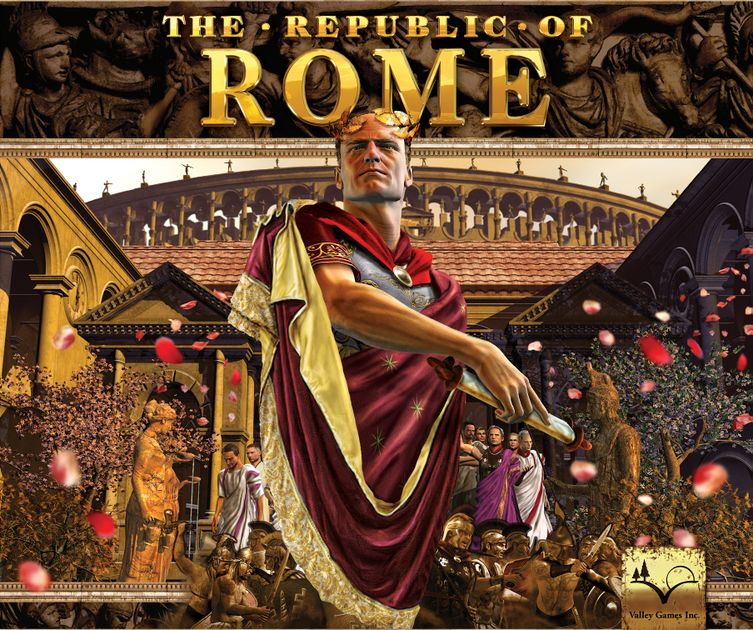Hello and welcome to another development diary for
Imperator:Rome! Today I will talk some more about the pops in locations that nobody owns, and colonization as well as the map of the Levant and the Traditions of Levantine and Arabian countries.
As you may recall from previous diaries
Pops in
Imperator are the base units we use to represent population. Each pop will have its own type, its own culture and its own religion. How they feel about the country that rules them will largely depend on both local conditions and on how closely their
culture and
religion aligns with your country.
As an example of the former is that certain pop types will be happier if they have access to certain
trade goods in their province.
An example of a more national level factor that impacts population happiness is their culture and religion. Pops that share your own religion and culture will generally be easier to manage than those of others. Though this may of course be modified by many things such as
ideas and
laws.
Pops exist throughout the cities of all countries on the map and in some regions there might be quite mixed population. Carthaginian Sicily for instance has a large Carthaginian upper class, while the Freemen, Slaves and Tribesmen are generally more mixed with local Siculian and Siceliote (Greek) culture.
Pop Movement:
Pops can move between cities as a result of scripted content such as
events (examples can be natural disasters, tribal groups feuding and migrations) as well as when a city falls and some of its population is
enslaved.
But the era of
Imperator is one where the government intervened quite a bit in population movement. With Hellenistic kings founding great cities in their own name such as Seleucia Magna, Antiochea, Lysimachea, or Ptolemais. The standard way to operate in many of these cases was to force the local population of nearby cities to move into one designated newly prepared location. Some would also be brought in from further afar, not in the least the Romans themselves, founding colonies, first in Italy and later all over their growing empire.
Much like the kings of the era, most of the time if you want a certain pop to be transferred to a specific place within your empire you will need to move it yourself.
A pop can be moved from one city to either an adjacent city, one adjacent across a seazone, or any other owned city in the same province for a power cost of
20 Civic Power.
Slaves are cheaper than other pops to move, and only cost
5 Civic Power to transfer. Since the number of slaves in a city also decides if it can produce more than one surplus of its Trade Good this means that you can more easily set up production centers for certain goods, whereas you will have to pay more power if you want to build a Metropolis in a way away
Civilization Value
As mentioned in an earlier development diary Civilization Value is a rating that exists in all locations on the map, and it represents the level of infrastructure and urbanisation in that location. As mentioned briefly in an earlier development diary this is a big factor for pop happiness. Tribesmen will be happier in cities with low Civilization value whereas more stratified pop types such as Freemen and especially Citizens prefer locations with high Civilization value.
Your country also has a national Civilization Value of its own (mainly increased by government type and technology) - all owned cities will slowly gravitate towards this value if they are below it, and slightly more quickly towards it if they are above it. Positive civilization growth can also never push the local value above that of your nation.
Colonization of Uncolonized Land
(population map mode)
From the interior of Sardinia to central Germany and Ireland, there is a lot of land that is
uncolonized and seemingly empty on the political view.
As long as you have an adjacent city of at least 10 pops you can send one of these pops into an uncolonized location and this pop will claim it for their home country at the same cost as the one you pay for moving pops inside your own lands.
This will turn the uncolonized location to a city under your control, but it will not change the culture, religion or type of any of the pre-existing pops.
If you are a country with a high civilization level the local Civilization rating will now start to climb towards your country value. Making it more suitable for your freemen and citizens, but most likely making the original population of tribesmen quite unhappy (potential ways to counter this is to spend power to convert them to another type or adopt the governor policy for Civilization Effort which changes the type of your tribesmen over time).
There are also other ways to resettle people, or to colonize new land. For instance using your army to create military colonies or tribal migrations. But that is something we will get into in greater detail in later Development Diaries.
Northern Syria
In 304 BCE Syria, much like Anatolia, was in the hands of Antigonus, represented by Phrygia in Imperator. Syria was a quite fertile and well populated region, one of the central Hellenistic regions Syri has a considerable Greek minority population after the campaigns and projects of Alexander the Great as well as the Successors that came after him.
At our start date Antigonus himself would have been in his namesake capital, the growing city of Antigonea, preparing for new Pan-Hellenic games, that he hoped would help to impress on the world the importance of his new dynasty and capital.
After the fall of Mesopotamia and Persia to Seleucus this capital is now much closer to the border with the Seleucid Empire than perhaps had originally been envisioned (and indeed in real life the city would eventually fall to the Seleucids and fall from glory, though the later Seleucid metropolis Antiochia would be founded close by).
Less concerned with the freedom of Non-Greek cities this region is not home to any subject city leagues like Anatolia and Greece. But a number of old states that once capitulated to Alexander remain and retain some level of autonomy in Phoenicia and northern Syria.
Starting Countries:
- Commagene: Small local tributary of Phrygia in the upper Mesopotamian region. Conquered long ago by Alexander Commagene is not central enough to warrant direct control by the its bigger overlord. In time this would be the site of the later kingdom of Commagene
- Bambyce: Small state based around the cult of the Canaanite deity Atargatis. The state predates Macedonian conquest but has sworn fealty first to Alexander and then to his successors. The Theocratic Monarchy is ruled by the hereditary High Priests of Bambyce.
Phoenicia & Upper Syria
While Phoenician merchants are still a significant force in the mediterranean, especially in and around Carthage, Phoenicia itself has been under foreign rule for a long time in 304 BCE. The great forests of Lebanon remain a prime source of wood for ships however and has been the goal for Egyptian expansion plans more than once for the largely wood-deprived kingdom.
A number of small Phoenician city kingdoms remain here since days past, having sworn fealty first to the Achaemenids and later to Alexander and then Antigonus.
The fortified city of Tyre itself, associated with the production of the fabled Tyrian Purple, remains under the direct administration of Phrygian army, and has been the site of many famous sieges in the years past.
This is also the region in which the huge Antigonid fleet of Demetrius was built before it set out to invade Greece and destroy the Ptolemaic navy off the coast of Cyprus.
Starting Countries:
- Arados: Small Phoenician city kingdom under Antigonid protection. At the start of the game Arados is a tributary of Phrygia.
- Byblos: Ancient Phoenician city kingdom on the coast below the Lebanese Mountains. Byblos has been populated for thousands of years but is by now, like the other kingdoms but a satelite of the greater Antigonid realm. At the start of the game Byblos is a tributary of Phrygia.
- Sidon: Historically one of the most important Phoenician city states, Sidon is now just one of a few remaining kingdoms on the Lebanese coastline. Awarded great autonomy Sidon would come to embrace hellenistic culture. At the start of the game Sidon is a tributary of Phrygia.
Judea & Nabatea
The Southern Levant is on the doorstep of Egypt and has come to be the site of repeated conflict between the Ptolemids there and the other successors but it has not generally been the price fought over. The current Antigonid control of the region has left much of the inland in the hands of the High Priests of Judea and Samaria, contenting itself with the control of major ports and fortifications along the coastline.
Before earning the nickname the besieger Demetrius fought his first battle in this region, just outside the Hellenistic trade port of Gaza. A scathing defeat that did not speak well of his future prospects as one among the other Diadochi.
While left alone politically the Jewish states were not unaffected by the influence of the Hellenistic states. Even here Hellenistic influence has penetrated the cultural and religious world of Judea and Samaria, something that would in time lead to theological as well as political conflict.
Starting countries:
- Samaria: Small hebrew Theocratic Kingdom. Ruled by the hereditary high priests of Shekhem and paying tribute to the Antigonid Empire. Samaria also has a growing minority of Greek origin but as of yet is mostly left to their own devices. This may well change if the borders of the great successor empires should stabilize in the future however. At start Samaria is a Tributary of Phrygia.
- Judea: Judea is ruled by hereditary high priests, at the start of the game this is Simon the first. By some identified as the legendary Simon the Just. Much like Samaria to its north the only direct influence of the successor kingdoms on Judea at the start of the game is cultural rather than political. The Antigonids are happy to leave the local High Priests in charge in exchange for regular tribute. At the start of the game Judea is a Tributary of Phrygia.
- Nabatea: Small Arabic Trading kingdom, controls most of the lands between Judea and the Red Sea, and lives to a large degree on the Frankincense trade between Arabia and the Mediterranean. At the start of the game Nabatea is independent and unaligned.
All of the above states (along with any other Arabic, Native Egyptian and Levantine powers) will have access to the Levantine & Arabic Military Traditions:
Levantine and Arabian Traditions
The Levantine and Arabian Traditions will allow the countries that have them to excel at desert warfare but also gives a few significant bonuses to Phoenician and Arabian navies in tribute to Phoenician and Arabian sailors.
Since this is a region with significant Hellenistic influence you can also to some extent embrace the martial ideals of the Hellenic Kingdoms.
Starting Tradition - Pathfinders: Land Unit Attrition -15%
“Arabian Path”
- Desert Sands: Hostile Attrition +0.50
- Merchant Coast: Trireme Cost -50%
- Beasts of Burden: Camel Offense +15%
- Ships of the Desert: Camel, Light Cavalry and Heavy Cavalry Desert Combat Bonus +15%
- Sturdy Design: Trireme Defensive +15%
- Legacy of the Builders: Training Camp Cost -25%
- Oasis Trade: Camel, Heavy Cavalry and Light Cavalry Cost -25%
- Finisher Bonus - Trained Camelry: Camel Discipline +15%
*Egyptian Path*
- The Spear of the Kingdom: Light Infantry Defense +15%
- Arms Race: Trireme Discipline +15%
- Stonemovers: Fort Defense +15%
- Colonial Integration: Allows Military Colonies
- The Blood of Egypt: Trireme Morale +15%
- Thick Hide: Camel Defense +15%
- Cradle of Civilization: National Manpower +15%
- Finisher Bonus - Rank Upon Rank: Light Infantry Discipline +15%
*Graeco-Levantine Path*
- Surfeit of War: Heavy Infantry Cost -25%
- Thorakitai: Light Infantry Offense +15%
- Machimoi Epilektoi: Heavy Infantry Offense +15%
- Greek Warfare: Allows Phalanx
- Good Reputation: Mercenary Maintenance -15%
- Ramming Speed: Trireme Offense +15%
- Unending Riches: Monthly General Loyalty +0.02
- Finisher Bonus - Learning from the Best: Heavy Infantry Discipline +15%
















 .
.


